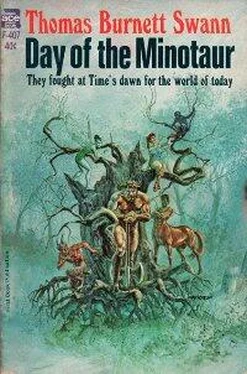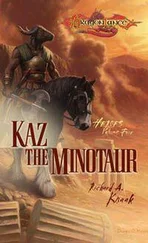Thomas Swann - Day of the Minotaur
Здесь есть возможность читать онлайн «Thomas Swann - Day of the Minotaur» весь текст электронной книги совершенно бесплатно (целиком полную версию без сокращений). В некоторых случаях можно слушать аудио, скачать через торрент в формате fb2 и присутствует краткое содержание. Год выпуска: 1966, Издательство: Ace Books, Жанр: Фэнтези, на английском языке. Описание произведения, (предисловие) а так же отзывы посетителей доступны на портале библиотеки ЛибКат.
- Название:Day of the Minotaur
- Автор:
- Издательство:Ace Books
- Жанр:
- Год:1966
- ISBN:нет данных
- Рейтинг книги:5 / 5. Голосов: 1
-
Избранное:Добавить в избранное
- Отзывы:
-
Ваша оценка:
- 100
- 1
- 2
- 3
- 4
- 5
Day of the Minotaur: краткое содержание, описание и аннотация
Предлагаем к чтению аннотацию, описание, краткое содержание или предисловие (зависит от того, что написал сам автор книги «Day of the Minotaur»). Если вы не нашли необходимую информацию о книге — напишите в комментариях, мы постараемся отыскать её.
Day of the Minotaur — читать онлайн бесплатно полную книгу (весь текст) целиком
Ниже представлен текст книги, разбитый по страницам. Система сохранения места последней прочитанной страницы, позволяет с удобством читать онлайн бесплатно книгу «Day of the Minotaur», без необходимости каждый раз заново искать на чём Вы остановились. Поставьте закладку, и сможете в любой момент перейти на страницу, на которой закончили чтение.
Интервал:
Закладка:
“Yes.”
“Well,” he said. “We are. Not old, but comrades. I want you to know that wherever you are, I am. To fight at your side and stand guard when you fall asleep. I want you to know that you are—friended.”
I have known two loves, I thought, one for a girl who wished to be my sister and therefore cut me like broken coral; one for a boy who wished to be my brother and therefore comforted me like the moss in which I sleep. If I had died before they came to the forest, my soul would have been a serpent, kind but ugly and earthbound. Now it will be a butterfly, and no barriers of wind will hold me from the perilous chasms of the clouds or the tawny orchards of the sunflower.
Warmed at last, we crept to the edge of the field which held my house. A tendril of smoke arose from the garden, like a beansprout climbing the sky, and the scent of venison piqued our nostrils.
“The swine,” said Icarus. “Gorging themselves in your house.”
“Yes,” I said, “but at least they haven’t burned it.”
“Think of the housecleaning after they’re gone,” he sighed. “Bones in the fountain. Grape skins on the bench. And you know”—he lowered his voice—“they won’t bother to use the watercloset.”
When we turned from the house to pursue our mission, the snake Perdix coiled at our feet.
“Uncle,” said Icarus, muffling his joyful cry into a whisper.
He clasped the snake in his hand and addressed him with great solemnity, careful to speak each word with separate emphasis. “Did you know that Thea has been captured?”
Perdix opened his mouth and flickered his forked tongue.
“He says he understands,” explained Icarus. “It’s the only way he can communicate, since I’ve never learned to speak in real snake. He really does understand what I say. Not everything, of course. Adjectives gives him trouble. But if I speak slowly, he catches the nouns and verbs. That time when Ajax was chasing Thea, just before we came to the forest, it was I who sent Perdix into the room to make Ajax angry. He can help us now, I think.” He restored Perdix to his familiar haunt in the pouch of his loincloth. I was still not convinced that the snake could help our mission, but I dared not belittle him within the range of his fangs.
Icarus with his snake was no longer a child with a pet. Rather, he treated Perdix as a warrior treats a dependable ally, a horse or a war dog, with trust, affection, and dignity. The three of us headed toward the town of the Centaurs, the obvious place for the main host of Achaeans and also for Thea’s surrender.
Along the way, we found that Ajax had preceded us to Pandia’s village. No house had escaped a pilfering, and Pandia’s log had been split down the middle by an axe. Shattered crockery and a few smoked fish, evidently not to the taste of the conquerors, testified to what had once been her well-stocked larder. They had emptied her Cretan Bears-tail out of its pot, as if they suspected a cache of coins, and worst of all, they had turned the communal berry patch into a small wilderness of raucous crows, uprooted posts, and stripped vines. The Bears themselves, it appeared, had been captured by Ajax and carried on his march.
Icarus glanced at the crows and scattered them with a well-aimed handle from a honey pot. “I’m glad Pandia didn’t come,” he said. “It would have broken her heart.”
“Or turned her stomach,” I said, and resumed our journey with revenge as well as rescue to spur my hooves.
We approached the farms of the Centaurs with great stealth, in case the besieging Ajax had stationed guards to protect his rear. Where the forest met the vineyards, Icarus climbed a tree to locate the enemy. I myself am not adept at climbing (except the oaks of Dryads). The branches have a way of buckling under my weight or catching my tail. But Icarus insinuated himself into the foliage with a skill which did credit to his mother’s race; and after his reconnoitering, extricated himself without a rustle.
A cobweb stretched over one of his eyes and gave him the look of a pirate, and a pirate’s ferocity crackled in his voice when he told me what he had seen.
“They are not besieging,” he said. “They have already captured the town! It’s too far to see clearly, but I could just make out bands of helmeted men wandering through the streets, as if they owned the place. I’ll have to move closer to get a real look.”
“Wait till night. Then we’ll go together.”
Darkness is a going instead of a coming; an absence of light rather than a presence of bat wings, mummy wrappings, ravens, or whatever other fanciful figure of speech we poets use to describe her. But a going can be as welcome as a coming, and daylight, hateful for what it showed, faded like a lamp which has burned its olive oil and left us to the kind secrecy of night. We crossed the vineyards, their green grapelets invisible beneath a moonless sky, and bypassed the compound to avoid exciting the animals. We saw, after first hearing, two Achaean patrols. They had been celebrating; they were still imbibing. They sang or laughed as they made their rounds, and paused whenever they met to swap convivialities. Under their belts they carried little flasks which they swapped and tipped to their mouths with a maximum of contented smacks. It was not hard to avoid them. If they saw us at all, they must have mistaken us for a pair of palm trees with broad trunks and without fronds.
We came to the clump of olive trees which I had previously noticed beside the moat, and one of them looked so staunch and concealing that I felt emboldened to risk my weight in the branches. I saw that most of the Achaeans had gathered in the theater to hold a banquet. They had built a fire in the pit and, using their swords as spits, begun to roast their dinner. Thea, our precious, surrendered Thea, sat on one of the tiers and seemed oblivious to men, fire, and food. The earless Xanthus pointed toward the fire as if to say: “Will you share in our feast?” She shook her head. “Thea,” I wanted to cry, “accept his invitation. Your supper last night was a bit of cheese and a slice of bread. You went to the Achaeans of your own will and now you must eat their food in order to keep your strength.” Then I discovered the reason for her abstinence. The Men were eating not only the domesticated pigs of the Centaurs, but some of the blue monkeys from the forest. The skinned and spitted bodies were clearly recognizable in the light of the fire, as eager cooks jostled each other to lower them into the flames and turn them from side to side. Blue monkeys. Thea’s monkeys. The forest’s laughter, she had said. I thought of what she must feel to have them offered her on a spit or a platter.
The men who were not cooking tippled from horns or wineskins, sang ribald songs about the women of their conquests—raw-boned Israelites who would slip a knife in your back when you closed your eyes; olive-skinned Egyptians who bragged about their sphinxes and pyramids and made you feel like crass barbarians; and Cretans with bare breasts who were good mistresses once they had satisfied their pride by making a show of resistance. One man sang a ballad about the famous Cretan bosom, which he variously compared to ant-hills, burial mounds, and helmets, none of them happy comparisons, it seemed to me (being a poet, perhaps I am too critical). Laughter, coarse and brutal, interrupted the songs, and Ajax, the swaggering victor, moved among his Men, drank their wine, and claimed the tenderest morsels from their swords.
Thus, the conquerors. The conquered lay in the streets. The sad, ungainly bodies of those gracious farm-folk, the Centaurs, together with splintered houses, broken lanterns, and torn tapestries, attested to a fierce battle in the very heart of the town. The surviving Centaurs, I saw, had been shut in the animal compound with their sheep and oxen and were now being guarded by a small contingent of soldiers, most of whom stood at the gate while two of their number patrolled the high and virtually unclimbable walls of thorn. None of the males had survived the battle; and a handful of females and children, along with the hapless Bears of Artemis and three Panisci, comprised the prisoners. I felt as I had when I saw my workers slaughtered before my eyes; if anything, worse, for Centaurs are higher beings, no less loyal and far more kind and intelligent. Chiron, the blameless king; Moschus, a bore but lovable: their faces came to haunt me, noble of mane, and the thunder of their hooves. But tears are a luxury not permitted to warriors on the threshold of battle. I stifled my grief into a far corner of my brain and let my anger flare like the fires in the forge of Hephaestus, the smithy god, when he works his bellows: anger which spurs the body to valor, the mind to craft.
Читать дальшеИнтервал:
Закладка:
Похожие книги на «Day of the Minotaur»
Представляем Вашему вниманию похожие книги на «Day of the Minotaur» списком для выбора. Мы отобрали схожую по названию и смыслу литературу в надежде предоставить читателям больше вариантов отыскать новые, интересные, ещё непрочитанные произведения.
Обсуждение, отзывы о книге «Day of the Minotaur» и просто собственные мнения читателей. Оставьте ваши комментарии, напишите, что Вы думаете о произведении, его смысле или главных героях. Укажите что конкретно понравилось, а что нет, и почему Вы так считаете.












